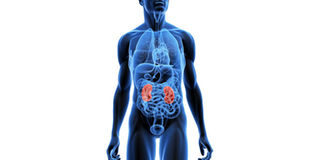Kidney, why you should take good care of it

In July, the media fraternity lost a sports presenter, Bashir Khan Lugudo to an acute kidney failure. Of late, out of 10 compassion stories (stories calling the public to help the sick who cannot afford it) that this newspaper publishes, at least two are cases of kidney failure. Country wide cases of kidney failure are on the increase. In order for us to know why, we need to understand the structure of the kidney
Structure of the kidney
Dr Ibrahim Jaffer, a general practitioner with Holy Cross Orthodox Mission Hospital, says kidneys are a pair of bean-shaped organs located in the lower middle part of the back.
He explains that these organs are made up of nephrons which are made up of glomerulus filter waste products and expel them through urine, serve various purposes.
“The main function of the kidney is to remove toxins from the body. It also plays the role of keeping the blood clean and regulates the amount of fluids in the body.” Sometimes people overload it because of their lifestyle leading to cases of kidney failure.
“The commonly known causes of kidney failure are diabetes, high blood pressure, hereditary cases and an interruption in the urine flow.
However, nowadays people have resorted to what I would call a careless lifestyle. They take alcohol, smoke, eat fast foods which are full of oils, they self-medicate. All this has led to a high level of occurrence of kidney failure cases.”
Dr Jaffer says that kidney failure occurs when the organ fails to serve its functions. He explains, “The kidney is meant to sieve waste products like toxins from the body. But in cases where there are a lot of toxins in the body, the kidney becomes overwhelmed and over strains the nephrons. The moment the nephrons are affected, they start swelling because of the excess water they cannot expel from the body. It will take a person some years to notice that they have a kidney problem because it does not show any signs and symptoms.”
The general practitioner elucidates that when the kidney stops functioning, it will lead to the retention of toxic substances in the body. These toxins in extreme cases will affect the liver and the heart.
Diseases that affect the kidney
He also adds that kidney failure is a general term given to the various diseases that affect the kidney like Nephritis Syndrome. “This occurs when the nephrons are swollen as a result of too many toxins in the body which cannot be expelled as soon as they should be.
The other kidney disease that results in kidney failure, especially among pregnant women, is polynephrities; a disease where the hydro nephrons (water nephrons) in pregnant women retain a lot of sodium leading to swelling of the lower limbs and a puffy face especially in the morning,” says the doctor.
www.renux.dmed.ed.ac.uk also adds that there are other kidney diseases that result in kidney failure. For example “Acidosis, which is the accumulation of acid in the blood, comes as a result of the kidneys not being able to get rid of enough acid or losing excessive bicarbonate in the urine.”
The site adds that acute renal failure is another kidney disease. It occurs when the kidneys stop working suddenly, or over a period of days to weeks.
There is also albumin a kidney disease which occurs when a protein that is present in the blood is in large quantities. It appears in urine if the kidneys are leaking protein, and can be measured in the urine and in the blood to show how severe the protein leak is.
How to avoid getting kidney diseases
Dr Jaffer says that since kidney diseases do not come with symptoms, it’s important that one carries out tests at least once a year. He explains that there are various kidney tests.
“A blood test can be done to determine the functionality of your kidney. Other tests are the imaging test which involves going through a scan. A kidney biopsy can also be done by cutting a small piece of the kidney to check out its functionality. The most common test is the urine test. It involves the analysis of one’s urine to check it for proteins and if found present in the urine, it signifies that the kidney has a protein leakage.”
He says, when detected, kidney failure can be treated through dialysis or a kidney transplant. He however advises that prevention is better than cure and recommends a healthy lifestyle.
“People should avoid excess consumption of alcohol. A glass or two of alcohol is enough a week, they should not smoke, stop eating fast foods which contain a lot of oils with cholesterol and always take water. Eight glasses of pure water a day is enough to keep one’s kidney healthy,” Dr Jaffer says.




